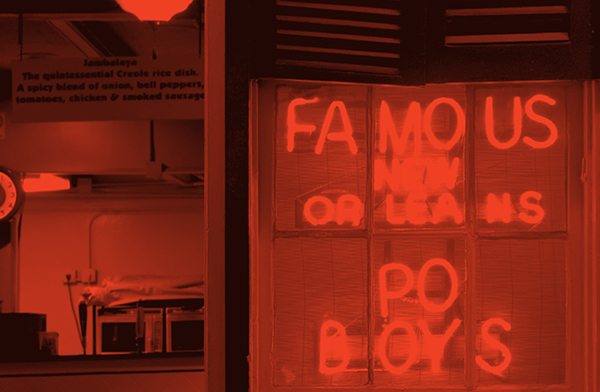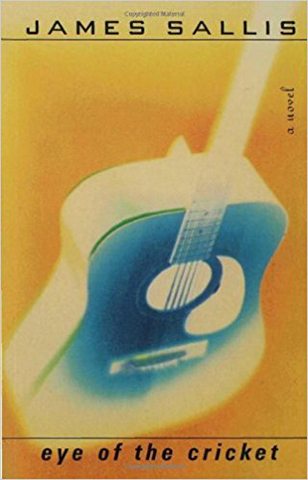Home »

James Sallis a poet clothed as a novelist
Book Review
By Derryll White
Sallis, James (1997). Eye of the Cricket.
“This is not so much a mystery as it is a meditation on the mystery that is life.”
-Anonymous Reviewer.
This is James Sallis’ fourth Lew Griffin novel. Lew is a black detective, teacher and writer living in New Orleans. He is a character that embodies the pre-Katrina New Orleans. Dark, brooding, a drunk and an artist most of his life, his soul is touched – no blessed – by Delta blues and New Orleans jazz.
Sallis reaches down, past the metaphorical shapes people place on their lives – party girl, family man, mother, layabout – to places where people reveal themselves. The darkness and foreboding of the streets yields pockets of brilliant music, and maybe a lady who truly knows what she has and offers it without guile. He gives noir a distinctive face and meaning, not dark and ugly but simply the willful act of people to wrest meaning from so very little. Lew Griffin is a philosophical man, doggedly pursuing loss so that he might give others meaning and hope. The dikes are giving way all around us as the human tragedy grows. One doesn’t have to read far to come to the present and the Syrian tragedy and exodus.
 “Good-bye, good luck, struck the sun and the moon,
“Good-bye, good luck, struck the sun and the moon,
To the fisherman lost on the land.
He stands alone at the door of his home,
With his long-legged heart in his hand.”
-Dylan Thomas.
James Sallis is a poet clothed as a novelist. His phrases are precise, colourful and open to any reader’s interpretation. His voice is very singular and clear and his thoughts are hard, on himself and everyone around him. He looks at loss in a very personal way, and allows Lew Griffin to experience it in every possible manner through booze, pain, death and societal disintegration. He speaks of America as a nation without culture, everyone polarized into small cells that connect together only through tv and the internet. Black as that sounds, Sallis manages to imbue the hard streets and alleys of New Orleans with a vibrancy not available in the suburbs. The stark contrast forces the reader to examine his or her own life and world. Sallis sees the colour line dividing America as a class problem, not a racial one. Then he nails with a single line the nature of this novel, a journey into what noir really is. “A painter once remarked that seeing consists of forgetting you know the name of the thing that’s seen.”
This book is about life. It charts the loves and losses of Lew Griffin in a voice so close to the soul that the reader sometimes gets lost in tears, not sure whose they are – Rimbaud, Sallis, Blind Willie McTell, Lew Griffin, the reader. Sallis is quite simply brilliant in losing everything so that he can find himself. ‘Eye of the Cricket’ will go on my permanent shelf, to read again and again and to be there for my daughters to find after I die. I loved it!
“Then I felt within me the desperate rebelliousness of things that did not want to die, the thirst of mosses, the anxiety in the eye of a cricket….”
-Enrique Anderson Imbert.
****
Excerpts from the novel:
ALCOHOLIC – It wasn’t bourbon in my glass, but non-alcoholic beer, Sharp’s. Four years since I’d had a drink. Somewhere along the way, a lot earlier than I wanted to think about, alcohol’s smile had become a grin, then just bared teeth. Whole chunks of my life had fallen into that maw. Friends, intentions, memories, years.
LIFE – For ten years, so long and often that I no longer really think about it, I’ve told this story to my students, Michelangelo’s definition of sculpture. You just take a block of marble and cut away whatever’s not part of the statue.
That’s what our lives do. Wear away what’s not part of the sculpture. Pare us down, if we’re lucky, to some kind of essential self.
Or to some hardened, unconsidering icon if we’re not.
MEMORY – Memory`s never been much of a timekeeper. Always whispers `Trust me.` Never one, though, to show up when needed, keep its room clean, do laundry, bathe on a regular basis.
GAY – At college in the sixties, both of them impossibly young, Richard (as they used to say) had brought Byron out – or they’d brought one another out. Then they’d openly lived together for a number of years. Something people throw parties and send out invitations for, nowadays. But back then that sort of thing was your own personal Pearl Harbor. It was underground nuclear testing in your backyard, Commie infiltration at the DAR, dry rot in the moral fabric.
NEW ORLEANS – New Orleans had clocked 421 murders for the year thus far. Even the folk out in Jefferson Parish were getting concerned, as violence spilled towards their precious suburbs. I kept expecting them to announce any day that they were putting up a wall.
PETS – The kettle called, and Bat followed me back into the kitchen thinking something more by way of food might happen there. Hope springs eternal. People drop things. The alert cat pounces before Providence has a chance to withdraw its offer.
HISTORY – The past is no insubstantial, thread thing, sunlight slanting through shutters into cool rooms, pools and standards of mist adrift at roadside, memories that flutter from our hands the instant we open them. Rather is it all too substantial, bluntly physical, like a boulder or cement block growing ever denser, ever larger, there behind us, displacing and pushing us forward.
And yes: in its mindless, rocklike, solid, unstoppable way, it pursues us.
 – Derryll White once wrote books but now chooses to read and write about them. When not reading he writes history for the web at www.basininstitute.org.
– Derryll White once wrote books but now chooses to read and write about them. When not reading he writes history for the web at www.basininstitute.org.







